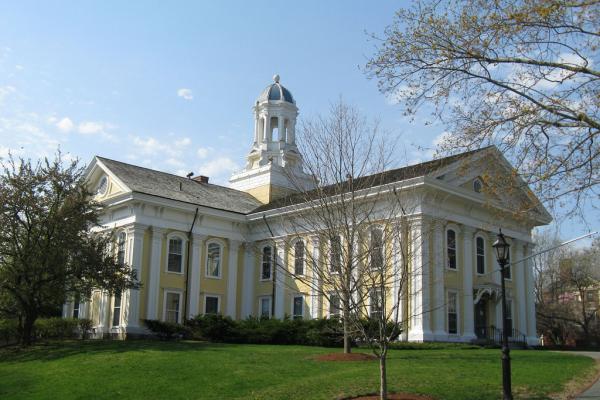The foundation of Madeleine L’Engle, the late National Book Award-winning author of A Wrinkle in Time, has awarded OneWheaton, an independent community of LGBT students and alumni from Wheaton College, a $5,000 grant.
OneWheaton is committed to affirming LGBT students but is not officially recognized by the prominent evangelical school, which can expel students caught in homosexual behaviors.
The group plans to use the money to fund public discussions and forums about LGBT issues and evangelical culture.
“We couldn’t be happier to receive this grant from L’Engle’s Crosswicks Foundation,” said Paul Canaday-Elliott, a OneWheaton board member.
“Wheaton tells a very one-sided narrative about LGBT persons without making room for dialogue,” he added.
“So this will help us continue to supply something that the college isn’t.”
OneWheaton was launched in 2011 and was followed by a public response from Wheaton’s president reaffirming the college’s belief that gay sex is immoral, catapulting OneWheaton into the national spotlight.
Located outside of Chicago, Wheaton is America’s most prestigious evangelical Christian college, boasting prominent graduates such as evangelist Billy Graham.
Since OneWheaton’s launch, dozens of similar LGBT groups have formed on Christian college campuses around the country, many adopting the “One-” prefix. OneWheaton has more than 1,000 followers on Twitter and hosts unofficial homecoming events near the college.
Many see the success of OneWheaton as further proof of increasing openness on matters related to homosexuality among America’s young faithful.
Canaday-Elliott said the Crosswicks’ grant was unsolicited. Charlotte Jones Voiklis, L’Engle’s granddaughter and a Crosswicks board member, was researching Wheaton College online in January and “began wondering whether the college reflected her grandmother’s intellectual legacy.”
As a result, she stumbled upon the OneWheaton website, which led her to contact the organization and eventually award the grant.
The Crosswicks Foundation was “established by L’Engle and her husband, Hugh Franklin. It has never publicly announced a grant award. Attempts to reach Crosswicks via telephone and email were not immediately successful, but the following quote from Voiklis was posted on OneWheaton’s private Facebook page:
“My grandmother had a long and deep relationship with Wheaton College and its English Department, and she was enriched by some of the vigorous debates she had with faculty and students there. I believe that the kinds of conversations OneWheaton is seeking to have reflect where she would be if she were still here.”
Wheaton’s library possesses a large collection of manuscripts, photographs, and artifacts from the life of L’Engle, a devout Episcopalian before her death in 2007.
Wheaton’s provost Stanton Jones did not want to comment on OneWheaton specifically, but released the following statement in reaction to the grant:
“The decision of the board of the Madeleine L’Engle family foundation to grant funding to other organizations bears no direct relationship to Wheaton College’s Special Collections serving as a repository for the papers of respected Christian author Madeleine L’Engle. We hold papers and other effects of a wide array of Christian authors whose work overlaps with our institutional mission; we do so without insisting that those authors or their descendants align with every aspect of our institutional identity.”
OneWheaton’s first event funded by the Crosswicks grant will be a public forum coinciding with Wheaton’s homecoming this October. Canaday-Elliott said the group is not ready to release details yet, but information posted to the group’s Facebook page says it will be a moderated discussion between Matthew Vines, an author and speaker who makes a biblical case for same-sex relationships, and Wesley Hill, a seminary professor and leader of a growing movement of LGBT Christians promoting holiness through celibacy.
“This will be an event that we hope will attract the interest of students and the Wheaton College community, and help prompt conversations that the college itself won’t facilitate,” the post stated.
Additional money from the grant will remain after the October event, and plans for its use have not been finalized. But once it has all been allocated, OneWheaton leaders hope to fill the coffers with more from other donors.
“OneWheaton has recently achieved nonprofit status,” says Canaday-Elliott.
“While we don’t have a grant strategy at this point, we plan to apply for more.”
Jonathan Merritt is senior columnist for Religion News Service and a contributing editor for The Week. Via RNS.
Got something to say about what you're reading? We value your feedback!
